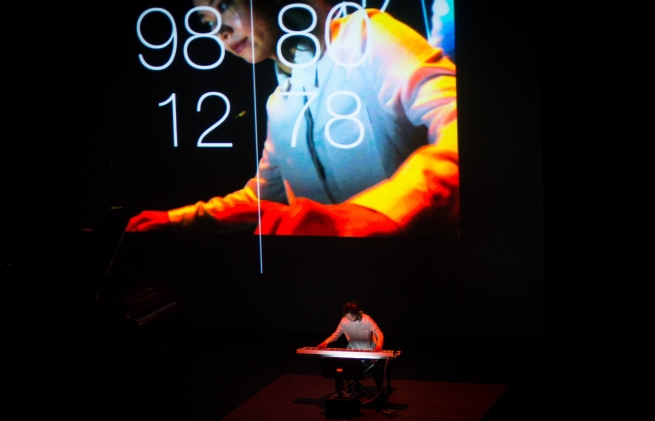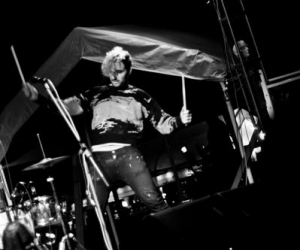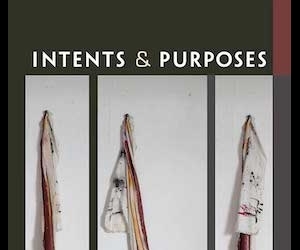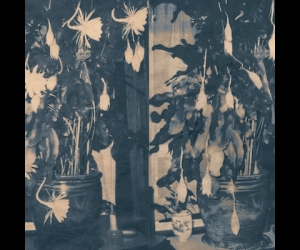Let’s get the complaints out of the way first, shall we? An awful lot of take-out sushi was eaten during the International Society for Contemporary Music’s annual festival, held this year in Vancouver. With up to five official concerts a day, plus secret showcases not entered in the program, there was precious little time for sit-down dining; even grabbing a coffee occasionally required split-second timing. Beyond that, a musician or two had to be replaced on short notice, due to illness, and one piece was removed without explanation from a concert.
Otherwise, the festival ran with exemplary precision. Every event afforded at least a few minutes of inspired music, and the performances were mostly focused and crisp—whether they were held in the cushiest of sit-down venues or in unconventional spaces such as the Vancouver Public Library’s downtown atrium.
While no trends emerged from the thirty-plus concerts presented during World New Music Days, one point came across loud and clear: through-composed music is in no danger of dying. Apart from an evening of graphic scores hosted by Vancouver’s NOW Society, the vast majority of concerts featured pieces that relied on the playing of notes on paper (or digital tablet), without much in the way of multimedia or theatrical accompaniment. There was an emphasis on intricately scored percussion (immaculately played here, by the way), an ongoing development in music in general since the advent of Edgard Varèse’s pioneering work in the 1920s. And it is safe to say that extended techniques are now part of every instrumentalist’s toolkit: spectral harmonics emanated from the strings; pianos were attacked in various unconventional ways; gongs were bowed and clarinets disassembled. But all that’s to be expected.
Many of the festival’s most memorable pieces departed from the Eurocentric norm—something that’s also to be expected in Vancouver, Canada’s Pacific Rim gateway, very much a city of immigrants. One spectacular success was the world premiere of Mohamed Assani and John Oliver’s Pressed for Time, a concerto for sitar, tabla, and orchestra, which for once fully fused these two very different worlds. Under Bramwell Tovey’s direction, at the Orpheum on November 5, the Vancouver Symphony Orchestra lent its full weight to Oliver’s dramatic, surging score, while allowing ample space for Assani to improvise on his starting motif. It was a triumph.
So, too, was Yasunoshin Morita’s ReincarnatiOn Ring II, part of an Annex program that otherwise featured flute virtuoso and former Powell Street Festival artistic director Mark Takeshi McGregor. Morita, dressed in a gorgeous ceremonial robe, added a quietly technological dimension to his measured and meditative shō, with several iPods attached to small amplifying docks placed around the seated audience. Moving from station to station, the artist effectively duetted with his digital self, enfolding the crowd in a magic circle of protective sound. And prior to that, McGregor had summoned up the spirit of the shakuchachi via the perfectly crafted Tamazusa, written for solo piccolo by seventy-four-year-old Japanese composer Etsuko Hori.
The quartet Red Chamber focused its showcase at the Roundhouse Community Arts and Recreation Centre on four new compositions for a mix of Chinese and Western instruments. The title of U.S.-based Fung Dic-lun’s The Distorted Identity Under the Globalized World offers an apt précis of what transpired, many of the pieces having aggressive atonality married to the clattering sounds of Chinese percussion. The most effective work, however, might have been the oldest and most meditative: Barry Truax and Randy Raine-Reusch’s enduring Bamboo, Silk and Stone, created in 1994. Red Chamber bandleader Mei Han, treating her zheng more as a sound source than as a traditional zither, contributed a tightly focused, partially improvised response to Truax and Raine-Reusch’s spacious electroacoustic environment.
Egyptian composer Amir Okba, an artist to watch, mixed the sound of the muezzin with elements of Coptic and orthodox liturgy in his ecumenical anthem Faith, sung by vocal ensemble Musica Intima as part of the New Vistas choral program at Christ Church Cathedral. And while Serbian-Canadian composer Ana Sokolovic is certainly working within the European tradition, it’s the folk elements of her brand new Evta that lifted it into something extraordinary. Drawing on the infinitely expressive fiddle traditions of the Roma, the piece requires the soloist to deliver an almost transcendentally committed performance—and Andréa Tyniec did just that, assisted by the Ensemble contemporaine de Montréal under Véronique Lacroix’s electrically charged baton. Aka ECM+, the ensemble is a good argument for Quebec’s generous arts funding; its sleek attention to detail bordered on the hyperreal.
Also impressive was three-quarters of the National Arts Centre Orchestra’s four-part opening-night concert, Life Reflected, at the Centre in Vancouver for Performing Arts. While the multimedia trappings of this Canada 150 project were not always necessary, Nicole Lizée, in Bondarsphere, her portrait of astronaut Roberta Bondar, put audiovisual elements to good use. That was no surprise, of course, nor was the gorgeous and heartfelt quality of Jocelyn Morlock’s My Name is Amanda Todd, a paean to a young woman who committed suicide after speaking out about being cyberbullied. Something not expected was Zosha Di Castri’s Dear Life. Based on a short story by Alice Munro, its chimerical textures were confusing and delightful: every time we wondered, How is she doing that? an opposing voice said, “Ssssh. Just listen.” It was almost as if she were inventing new instruments out of the orchestra’s familiar parts.
On the instrumental front, Montreal’s Bozzini Quartet and Victoria’s Emily Carr Quartet delivered exceptional programs, both full of premieres. The Emily Carr first violinist, Müge Büyükçelen, gave a passionate solo recital with an emphasis on Eastern European material, to which she is well suited, then returned as soloist in the Victoria Symphony’s world premiere of rising star Jared Miller’s beautifully crafted Concerto corto. Pianists Vicky Chow, Eve Egoyan, Rachel Kiyo Iwaasa, and Megumi Masaki all impressed in an expansive, if overlong, exploration of mostly boundary-pushing approaches to the keyboard: Hildegard Westerkamp’s nostalgic yet illuminating Klavierklang for Piano and Stereo Soundtrack (played by Iwaasa) and Rémy Siu’s relentlessly dystopian Foxxconn Frequency (no. 2), featuring Chow, stood out out for their conceptual depth.
Let’s end by awarding the Most Engaging Performance award to Montreal singer and interdisciplinary creator Gabriel Dharmoo, whose hilarious and provocative Anthropologies imaginaires took subtle aim at the prejudices and preconceptions we bring to the listening experience, while beautifully reaffirming how much can still be done by one performer, one body, and one voice. If World New Music Days had a hit, this was it.
Kudos to the team—and especially to artistic director David Pay, who somehow managed to hang on to his sunny demeanour for the entire week. They took on an unprecedented challenge and delivered the goods as if they were used to hosting Olympic-calibre events on a regular basis.
Top photo: Bondarsphere by Nicole Lizée, performed by the National Arts Centre Orchestra at ISCM World New Music Days in Vancouver, November 2017. Bottom photo: Vicky Chow playing Vancouver composer Remy Siu's Foxconn Frequency (no. 2) at ISCM World New Music Days 2017.
Photos by Jan Gates.





